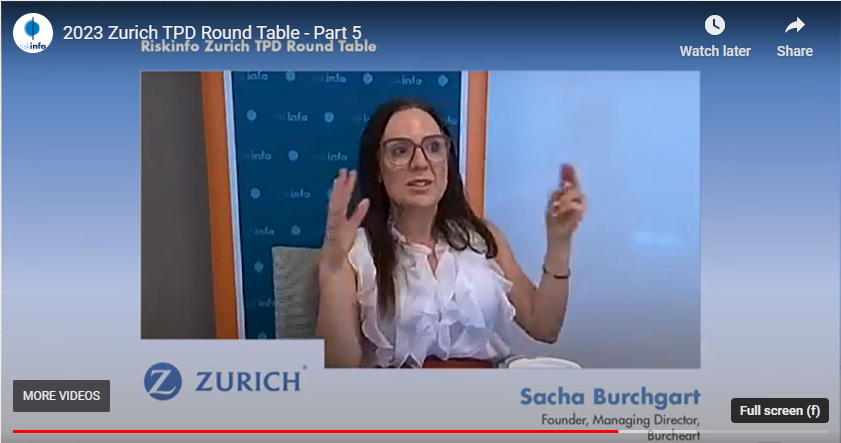Momentum is building for a self-regulated industry collaboration which would re-set the parameters around the delivery of the total and permanent disability insurance product in Australia. One element in the mix includes changing its name.
In concluding last month’s TPD Round Table event the experienced panel, representing a broad cross section of the sector, were in agreement that innovation, spurred by greater competitive forces, was desperately needed and was potentially on the way.
A range of thoughts and solutions tabled by the panel (some solutions designed to generate further discussion) included:
Develop Instalment Lump Sum Claim Benefits
Two of the biggest issues revolved around two key words, namely ‘subjectivity’ (in assessing a TPD claim) and ‘permanency’.
The panel articulated the challenges associated with having to resort to subjectivity in order to determine the permanency of a claimant’s total disability status.
To address this issue, a future product model could offer an instalment-style claim benefit arrangement which would allow a proportion of the insured benefit to be drawn down without the need for the claimant’s condition to be conclusively determined as being permanent.
There were also suggestions this approach may assist the mental health of claimants, enabling their self-perception not to be one of ‘permanently disabled’.
Change the Name
Stemming from the idea of developing an instalment benefit payment structure comes the need for a name change – one which would not include the word ‘permanent’.
a different name can generate …a different mindset
Some would argue: ‘It’s just a name change.’ But at the same time, a different name can generate a different perspective – a different mindset – to addressing the problem and finding a solution. Once ‘permanent’ is removed from the TPD product name, it’s obvious more flexibility can be built into such offers and more solutions may be possible.
Collaborate on Returning to Wellness
Another benefit potentially associated with total disability instalment claim benefits would see the insurer pro-actively assist the insured in their rehabilitation programme, as appropriate for their circumstances.
The instalment claim benefit payments could contribute to funding the cost of recovery and rehabilitation during the claimant’s period of total disability, with their total disability status reviewed, for example, every three, six or 12 months.
It was suggested this style of benefit payment would also more closely reflect one of the basic intentions of why such benefits are offered – namely to replace future lost earnings and to fund the structural and other adjustments in their daily life that may be required to accommodate a person who has become totally disabled.
Offer Severity-based TPD Claim Benefits
Not exactly proving popular within the trauma insurance space in Australia, the panel nonetheless outlined the potential for a severity-based scale of TPD claim benefits in which, for example, musculo-skeletal conditions – conditions that are generally able to be assessed against a more objective set of metrics, may pay a complete or at least a higher proportion of the insured benefit compared with claims paid for neurological conditions that are generally much more difficult to objectively assess.
Demographic Reassessment
Underwriters reiterate they only ever have one chance at ‘getting it right’ when it comes to underwriting a TPD policy submission. Given the significantly increased average number of vocations held by people in today’s world, would it be reasonable from a sustainability perspective for insured lives to be reassessed, say, every five years?
Very importantly, there is no suggestion that this potential reassessment would ever include any medical reassessment. Rather, it would apply to the insured life’s demographic status including current financial circumstances and needs as well as their occupation at the date of the reassessment.
Mental Health Exclusions
Notwithstanding consensus among the panel that there was merit in offering TPD-style products that exclude neurological or mental illness conditions from being claimable, CALI CEO, Christine Cupitt, made the point that the Disability Discrimination Act does not allow blanket mental health exclusions unless there is an actuarial basis supporting this proposition – a basis that a tribunal ruling has declared is not currently supported.
Further exploration of this proposition, however, may travel a pathway that would offer an insured life the option – a personal choice – as to whether to include some neurological and other mental illness conditions in the policy under which they seek coverage for total disability.
As long as there was appropriate observance of existing laws and rulings, the advisers and others on the panel believe their clients would welcome the opportunity to be offered this choice, thereby delivering a tailored and more flexible total disability solution to the consumer.
Click here or on the image below to take you to the final exchange in this TPD Round Table, in which your peers share their thoughts and ideas about how to re-shape, re-think and re-imagine a future version of total and permanent disability which would offer greater flexibility while remaining sustainable, accessible and affordable for an Australian community which extends across a very broad base of protection needs.




